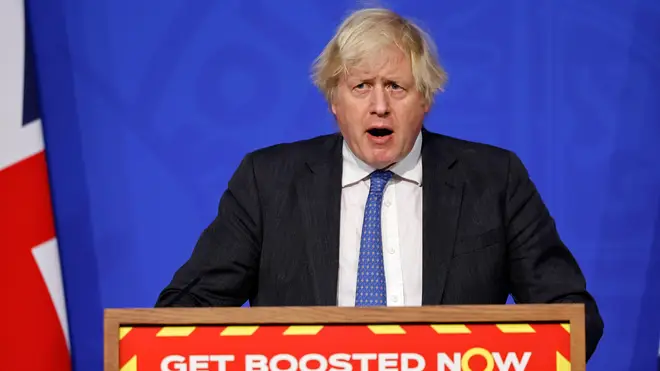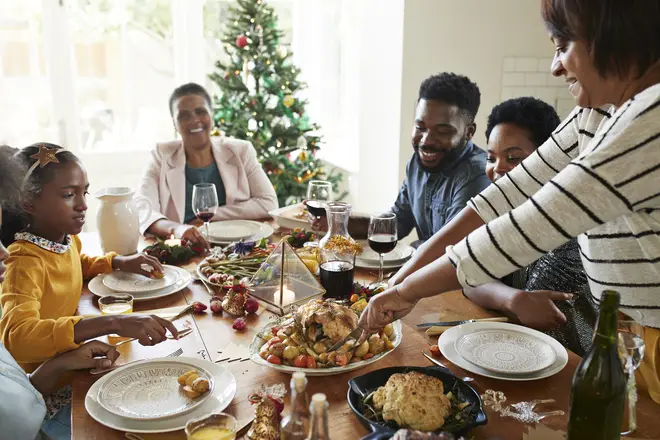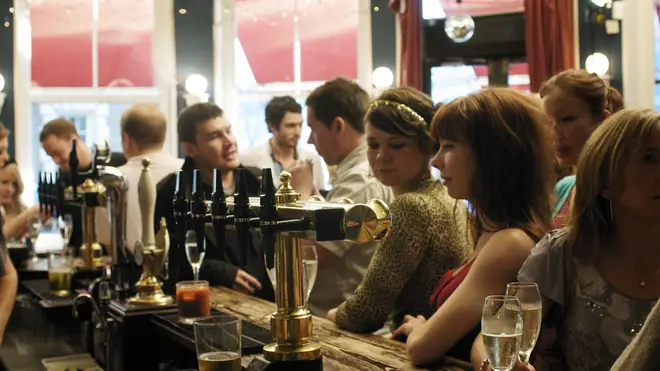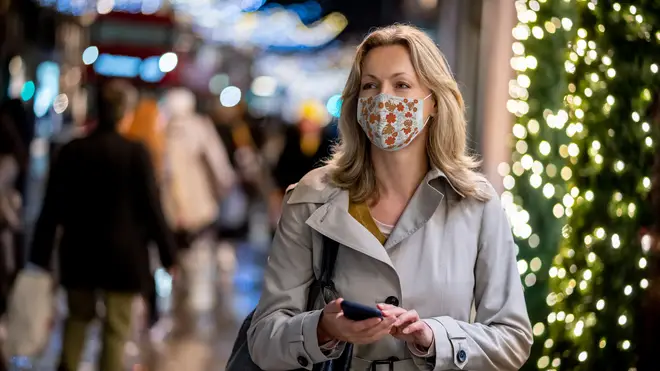On Air Now
Heart Breakfast with Jamie Theakston and Amanda Holden 6:30am - 10am
17 December 2021, 10:35 | Updated: 17 December 2021, 10:43

Boris Johnson outlines Plan B coronavirus measures
From face coverings, to festive family get-togethers - here's everything you can and can't do under new Covid rules.
As we get closer to Christmas Day, the government is warning Covid could put a halt to millions of family plans this year again.
The Omicron variant has seen coronavirus numbers reach an all time high, with work parties and big gatherings cancelled.
But while Prime Minister Boris Johnson has insisted the UK will not go into another lockdown yet, what are the current coronavirus rules?

There are currently no social distancing rules in England, which means families and friends are free to meet over the festive period.
However, the government has urged people to take precautions in the run up to December 25, to try and slow the spread of Omicron.
Firstly, Boris Johnson has urged people to take rapid lateral flow tests before meeting anyone.
These can be picked up free from pharmacies and you can also get them at any Covid test or vaccination centre, or order online from nhs.uk/get-tested.
If the test shows positive, you’ll need to self-isolate for ten days and should only leave the house to take a PCR test.

The PM has also advised people to keep a flow of fresh air if you are meeting indoors or change your plans to an outdoor setting.
Covid-19 spreads more quickly in enclosed spaces, so if you are inside make sure you open doors and windows for as long as possible.
Professor Chris Whitty urged people to be responsible and help halt the spread of the virus by ensuring ‘really good ventilation’ and meeting outdoors.
He said: "Don't mix with people you don't have to for either work or family things, only for things that really matter to you."
While Mr Johnson has vowed not to close venues in England, Covid passes are now in force in bars and clubs.
Under new guidance, NHS Covid Passes are mandatory for those 18 and over for larger venues with crowds.
The rules apply to venues which hold 500 people indoors, outdoor venues with more than 4,000 people, as well as any outside venue with more than 10,000 people in an effort to contain the spread of the virus.

Other venues that must carry out checks include:
As for Wales, nightclubs have been closed completely, while in Scotland the government has said retail and hospitality should consider measures to reduce crowding and queuing.
The Scottish government has also advised a return to a table service system for hospitality.
In England face coverings are compulsory in some public indoor venues, such as shops, cinemas, theatres and places of worship.
The government has also advised wearing them in other busy public settings and when meeting up with lots of other people.

The work from home guidance is back, which means those who can do remote working should.
In Wales, the country has also brought back social distancing in offices, which means employees must be at least two metres apart at all times.
In Scotland, rules state masks should be worn inside all businesses and social distancing is being advised in the workplace.
The government is urging everyone over the age of 18 and last had a vaccination over three months ago, to book their booster jab.
"I'm afraid we're now facing an emergency in our battle with the new variant Omicron," said Mr Johnson.
"It is now clear that two doses of vaccine are simply not enough to give the level of protection we all need. But the good news is that our scientists are confident that with a third dose, a booster dose, we can all bring our level of protection back up."

Boris Johnson announces Britain's move to plan B amid Omicron coronavirus variant spread
Under ‘Plan B’ measures, anyone who comes into contact with someone who has tested positive for the Omicron Covid variant and is double vaccinated must take daily tests for seven days.
Those who are not vaccinated must isolate for 10 days.
The government introduced new travel rules to try and reduce the spread of the Omicron variant.
Those returning to the UK must take a PCR test on or before the second day after they arrive and self-isolate until they test negative.
Anyone travelling to England, Wales or Northern Ireland must have proof of a negative PCR or lateral flow test taken two days before they travel.